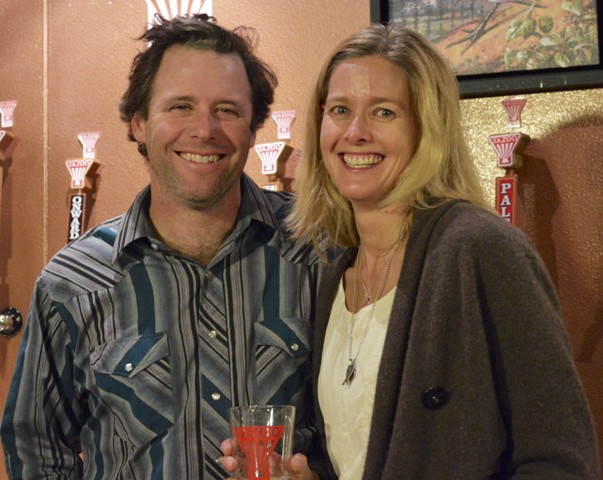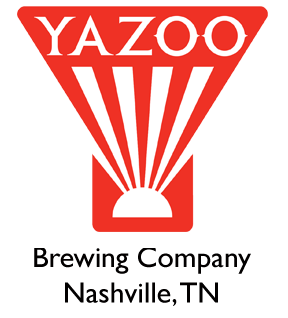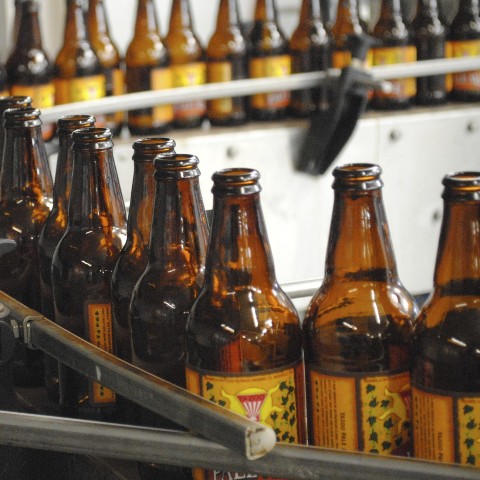Per Matt
When people mention Nashville craft beer, one of the first modern-day breweries to come to mind is usually Yazoo. Middle Tennessee is currently enjoying a thriving craft-beer scene and the brewery has helped foster that prosperous culture throughout the years. After outgrowing its original headquarters at Marathon Motor Works, Yazoo Brewing Company moved into its current downtown location and Linus Hall, the co-founder and brewmaster of Yazoo Brewing Company, has been prospering ever since. At the Music City Food + Wine Festival, I visited with Mr. Hall to discuss how he got started as a brewer, the overall Nashville craft-beer scene and how he began to Embrace the Funk.
How did you get your start, as a brewer?
– “Well, it’s a pretty typical story. I started homebrewing in college, when I was at the University of Virginia, back in the ’90s. I ended up in Nashville, working at a tire company. I was homebrewing on the weekends, giving away all the beer I was making. I couldn’t possibly drink it all. This was back in the day when maybe Sierra Nevada and Flying Dog were the only brands of craft beer you could get, around here. A lot of people would try it and thought it was good. They would say, ‘Maybe you should quit that tire job and start your own brewery.’ Once that idea gets planted in your head, it’s pretty tough to get it out. I remember talking to my wife about how cool it would be to start a brewery, as we were walking in Shelby Park, and she said, ‘Either do it or shut up. I am so tired of hearing you talk about it. Quit your job. I’ll support you and it’ll all be great.'”
“I went back to school and I got a business degree at Vanderbilt and then I went to the American Brewers Guild program, which ended up with an internship. I pestered Garrett Oliver, up at Brooklyn Brewery, for about six months. I sent him this letter and he wasn’t really responding, but I’d been up to visit his brewery, because my little sister lived in New York City for a while. We had dinner reservations and I had just gotten my last beer at the brewery. My wife told me we had to go, but I couldn’t chug the beer. This was a really good beer. I kind of stuck it underneath my coat and I’m walking down through Brooklyn with an open beer. We get to the subway and it’s deserted, but this guy sees me drink it. He says, ‘You don’t want to be drinking out here. You’ll get a huge ticket. They might even throw you in jail.’ So, I put it down and walked away from it. We’re waiting for the L train and I keep looking over at it. So, I walked over, picked up the beer, took one more sip and the guy who warned me was a transit cop. About the time I was pestering Garrett for an internship, there, I get this letter that’s garnishing my wages for this drinking-a-beer-on-the-subway ticket. I wrote him a letter and photocopied it. I told him, ‘At least let me pay this stupid fine in person, because it’s your beer that caused it.’ It was a good start.”
“That was right when 9/11 happened. It was an interesting, horrible time to be there. I learned an awful lot, came back and realized Nashville had some really good brewpubs. We had Boscos and Blackstone, but you couldn’t get that same quality of beer out in a restaurant or on the shelves of a store. That might be a niche that we could do. We could do small batches and package it. People would support it, if it was good. We found our old location, at Marathon Motor Works. We kind of boot-strapped our way into it. Me and my Father-In-Law did everything that we could do without having to get a permit for. We started with draft only, delivering kegs out of the back of my pickup truck. I would go out with growlers and if I got a sale, I’d be back that night, with a keg. We did that for about a year. We got to about 1,500 barrels or so and then we realized we couldn’t keep doing it all by ourselves. So, we signed with a distributor, Lipman Brothers. They’ve done a good job. They know how to build small brands, be patient and let them grow as they need to grow.”
You’ve been in Nashville during the craft-beer dark days. What it was like, back then?
– “Well, it’s like that joke in The Blues Brothers. I’d go into a bar and they’d say, ‘We’ve already have all four kinds of beer. We’ve got Bud Light, Coors Light, Miller Light and Heineken. Where does yours fit in?’ Well, mine has hops. It really was like that. Definitely, the consumers were further ahead of the restaurants and retailers. Every day was teaching and learning and trying to educate people. That’s why I think Nashville is a really collaborative beer scene, because we’ve all had that experience. We’re trying to educate people and bring them into the fold. We’re not really competing against each other as much as we’re trying to get people who naturally ask for your lightest beer to enjoy flavor.”
Please tell me a little about your flagship beers.
– “On the Yazoo side, definitely the Pale Ale and Dos Perros make up a big chunk of our sales. For people who like a little sweeter finish, Dos Perros satisfies that and for people who like a more balanced hoppy beer, they like that as well, with our pale ale. In the summer, our Hefeweizen picks up and does really well and then we’ve started doing a lot more seasonals. We’ve got four or five seasonals that we’re doing now.”
Can you tell me a little about your current Fall seasonal beer?
– “It’s a Oktoberfest-style German lager. It’s got lots of Munich malts and some traditional German hops. It’s lagered for a long time with German yeasts, so it’s got a real clean, crisp finish at the end of it.”
Please preview your upcoming Winter Seasonal beer.
– “After the Fall Seasonal, we’ll release a Winter Seasonal that we call a Scotch Ale. It’s got a lot of Maris Otter malts, nice rich biscuity malt with a little bit of dark crystal malts. So, it’s got a rich, bread-y, almost toffee flavor, to it. We’re looking at probably doing a fifth seasonal, around January and February. If it works out right, we’re probably going to do a Pilsner, that we’ve got a couple of different recipes we’re working on.”
How did you initially get involved with brewing Gerst beer?
– “It was fun. A local family — the Chandler family — owns The Gerst Haus, as well as all the Sportsman’s Grilles and a few other things. I was actually helping them put in a draft system at the Sportsman’s Grille in Hillsboro Village and got to talking to them about Gerst. They were having problems finding a brewery to brew it for them. They were kind of floating around between Evansville Brewery, up in Indiana that went out of business and Pittsburgh Brewing was doing it for them, but it was always variable in quality. I was talking to Jerry Chandler and told him that beer deserves to be brewed in Nashville and if we ever had the capacity, I’d love to do it for him. When we moved into our new brewery and I called him up and told him I thought we had enough capacity to add another brand. So, we jumped on it.”
“We didn’t have much to go off of. He wanted an easy-drinking Amber ale. We looked around for some recipes that they had, but nothing really jumped out. I just started doing some test batches and we found one that we really liked and I thought would historically accurate to that time. It uses a little bit of flaked corn and some German hops. We ferment it cool, so it resembles a lager, but it uses our ale yeasts. I thought we would just brew it for their restaurants, but then some people started asking us to bottle it and now it’s probably our fourth best seller. We sell beer down in Mississippi and nobody’s ever heard of Gerst there, but it’s a big seller down there, too. We tapped the first cask at the old Gerst Haus and we invited the mayor to come down. Karl Deen tapped the first cask, had the first pint and said, ‘This is a great time to celebrate Nashville, because we’re tying together our old history of brewing with our current history.’ It was neat.”
I’m a huge fan of your Embrace the Funk program. Can you tell me a little about its direction?
– “I love those styles of beer. My wife and I came back from a trip to Belgium awe-inspired by it. I’d known Brandon Jones for a long time and we thought, ‘Somebody’s going to do this, let’s do it ourselves.’ He had started the Website, Embrace the Funk, where he was trying to teach people about these beers. It was an extension of what I said before: We were always trying to turn people onto new things and this was something we really loved and wanted people to experience. It’s grown from just a few barrels above the brewery to a dedicated Funk House that’s about 6,000 square feet. It’s just a big concrete bunker. We’ve got a new 40-barrel foeder. We’ve got some consecutive releases of our Flanders Red aged in wine barrels called Deux Rouges. We’ve got a bunch of stuff going on. It’s just been a lot of fun.”
I heard a rumor you left some equipment when Yazoo moved, that’s currently being used by Corsair.
– “Yeah. Corsair started in Bowling Green, because they couldn’t operate a distillery in Tennessee. They had to get the laws changed, first. While they were waiting on that, they were having different people make their wash for them. I met Andrew Webber and basically, he wanted to make a 100 percent rye beer that they would turn into their rye whiskey. So, we made their first-ever 100 percent rye beer. It was awful. It was the worst experience, ever. When we finally pumped it over into his truck, to take it back to Bowling Green, we thought it would make the worst whiskey in the world. They won all kinds of awards for it. So, when they were looking at setting up in Nashville, we were looking at moving into our current location. It just worked out great that they took over our lease and some of our old equipment. Our 10-barrel system and I think some of our fermenters are still there, because to make whiskey, you make beer, first. It’s basically unhopped beer first, then you ferment it. Get the alcohol, run it through the whiskey stills and then put it in barrels.”
“Not a lot of people know this, but when we were making our first Embrace the Funk Deux Rouges batch, we didn’t want to make a 40-barrel batch until we were sure we had the recipe right. So, we asked Corsair if we could come over and brew on our old system. We made a 10-barrel batch and that was our very first batch of Deux Rouges. Now, it’s kind of funny, because some of the funk that we had, over at Marathon, has been moved into our barrels. I had pretty vivid flashbacks of brewing there, back in the day. It was a challenging environment to make beer in an old building. It’s a fun place to drink a beer, but it was a tough place to have a brewery.”
To what do you attribute the booming craft-beer scene of Nashville?
– “Nashville’s like a lot of small towns, knitted together. It’s really a chef-driven environment. When somebody has something good going on, a lot of people know about it. When we would get a tap somewhere, the next thing I know, so-and-so’s friend would say, ‘I heard you’re selling a lot of Pale Ale. I’d love to try it at our place.’ That’s been the secret to Nashville’s rise, as a food town. Everybody knows everybody else and what’s going on. They’re collaborating and it’s not a cut-throat environment. That kind of lends itself to the craft-beer scene. The way to get Southerners to try a good beer is with food. We have a great food culture, but we never had a brewery culture. If you’re trying to get someone to try your India Pale Ale and it pairs well with a meal, it’s a match made in heaven. That’s why, I think, a lot of the small breweries, here, have a really tight relationship with with a lot of the chefs in town. You can see, at an event like this, how chefs love to support the local breweries. It was almost unheard of, five or six years ago, to have a place that opened with 12 taps. ‘How are you going to sell all of that beer?’ Now, you have places that only serve local beer on tap, with one from each brewery. It’s crazy, when you think about it.”
Does Yazoo sponsor a lot of beer dinners?
– “We do. That’s definitely a good way to introduce yourself to a new market. We don’t do as much, here, in Nashville, as we did when we first started, but if we’re in Knoxville or Memphis, that’s a great way to show the wide range of flavors your beers can have and how they can pair really well with different things.”
What does the remainder of 2015 bring for Yazoo?
– “We’re hoping to wrap up the year strong. We’re excited about finishing up our Fall Seasonal and starting up our Winter Seasonal. We’re going to be expanding, hopefully, pretty rapidly, again, next year. We’ve got a new bottling line and labeler coming on line. It’s kind of that time again, where we’ve got to spend some more money and buy some more equipment to try keep up, which is fun. It seems like, when you’re a small brewery owner, and you talk to others, it never ends. You’re always having to buy more stuff to keep up, which is a good problem to have, but it’s always a challenge.”
Are there any current plans to can your beer?
– “Canning is an option and we’re looking at probably either a mobile-canning guy or there’s a co-op idea that hopefully will come to fruition, to where you can bring your beer to that location and have them can it. The problem we have now is we don’t physically have space, anymore, to do it, so we would have to find a third way to do it.”
Is there anything else you’d like to add?
– “People always as, ‘How many breweries can Nashville support?’ To me, the more the merrier, to a certain point, but I don’t think we’re anywhere close to a saturation point. If you go to Seattle, you don’t say, ‘How many coffee shops can they possibly support?’ If we have too many, the ones that aren’t doing a good job — as far as beer or letting people know where they are — probably won’t survive. I think with the ones we have now, everybody’s doing their own thing and making some interesting, good beers. I don’t think we’re anywhere near a saturation point. It hasn’t hurt us, or any of the existing breweries, at all, having more and more people coming on line.”
For More Information:
– Yazoo Brewery Twitter
– Yazoo Taproom Twitter
– Yazoo Facebook
– Yazoo Brewery Website
– Yazoo Instagram


